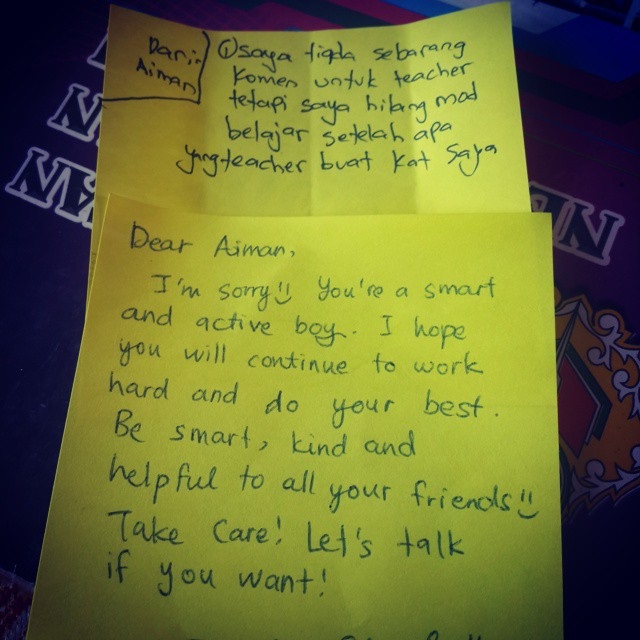As a new teacher, my classes are often observed by various administrative members. They often provide feedback on how I can improve my lessons and how to push my students to achieve better. I have always understood the importance of listening to feedback, but what I didn’t realise was that my most useful and valuable feedback often came from my students.
As teachers, we are accustomed to being an authoritative figure in class. We tell our students what to do and how to follow instructions. We teach them how to read and write and we have no qualms about giving them our opinion about everything and anything. We read their essays and tell them how they can write them better. We correct their behaviour and tell them to sit a little straighter during our lesson. We reprimand them when they misbehave and remind them to act as dignified young people. We silence them when they are talking because they are here to listen and we know what’s best for them. We are, after all, teachers.
But in the process of it all, we forget that our students are young adults capable of formulating their own thoughts and ideas. I always obsess about achieving my lesson outcome that I tend to disregard how my students really feel in my class. When I mark their books and read their grammatically correct sentences, I feel a sense of accomplishment because I know they had listened to me and I have achieved what I set out to do. It never occurred to me to ask them how they felt about my lesson or my teaching.
Then one day, towards the end of the last year, I decided to ask my students to write down their thoughts about my class. Much to my surprise, one group of students pointed out how I always took sides when it comes to a particular student, Abdullah. Abdullah was funny and witty in class and I had a tendency of picking him to answer questions. I didn’t realise this made the other students feel left out and after reading their feedback, I quickly corrected myself and ensured I gave every student a fair chance to participate in class. Since this incident, I have taken great care to exercise fairness in all my lessons.
In another class, a student said how he lost his “mood” to study after what I did to him. I remembered that I had refused to let him use the electronic dictionaries during a lesson because he was being disruptive. In my eyes, I saw it as a normal punishment but I did not realise that it would affect him so much that he did not want to participate in my classes anymore. I quickly wrote back to him and asked him to come and speak to me so we can talk more about why I punished him. As we spoke, I apologised for being too harsh and he promised he will be less disruptive during my lessons.
 Feedback from the student who lost his ‘mood’ to study. – Pic by Cheryl Ann Fernando, January 22, 2015.These incidents serve as a powerful reminder to me on the importance of stepping back and asking students to point out what I’m doing right or wrong in my class. As I discussed this with a fellow teacher, she told me how she was speaking to her students about the importance of respect and gave them authority to call her out if she was ever disrespectful to them.
Feedback from the student who lost his ‘mood’ to study. – Pic by Cheryl Ann Fernando, January 22, 2015.These incidents serve as a powerful reminder to me on the importance of stepping back and asking students to point out what I’m doing right or wrong in my class. As I discussed this with a fellow teacher, she told me how she was speaking to her students about the importance of respect and gave them authority to call her out if she was ever disrespectful to them.
She mentioned that she was a little nervous doing this as it meant putting herself out there, but she also knew that the only way she was going to teach kids about respect and giving feedback is by being an example herself.
By asking and listening to feedback, many of my fellow teachers have managed to change and improve their teaching strategies and help students get the best out of every lesson. I’ve also noticed how my students are now much braver and confident to say or write what they feel about issues around them.
These days, I actively seek their opinions and take into consideration their ideas and thoughts before carrying out any projects in our classroom or in school. The voices of our young minds should be sought not silenced.
There is no need for us to be afraid of their opinions or ideas because the only thing we should be afraid of is their lack of ideas. We need to start listening to them, be in schools or universities, to help us lead them better.
As teachers and even as leaders, it is not enough to give them knowledge and tell them how to use the knowledge. We should be teaching them to create new knowledge for their own generation. The only way we can start doing this is by listening to their voices and more importantly, giving them a voice. – January 22, 2015.
* This is the personal opinion of the writer or publication and does not necessarily represent the views of The Malaysian Insider.


Comments
Please refrain from nicknames or comments of a racist, sexist, personal, vulgar or derogatory nature, or you may risk being blocked from commenting in our website. We encourage commenters to use their real names as their username. As comments are moderated, they may not appear immediately or even on the same day you posted them. We also reserve the right to delete off-topic comments